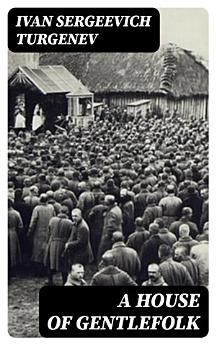關於這本電子書
In "A House of Gentlefolk," Turgenev masterfully weaves a rich tapestry of 19th-century Russian society, exploring themes of love, social class, and the generational divide through the lens of a fading noble family. The novel employs a delicate lyrical style, characterized by its nuanced characterizations and insightful psychological depth, reflecting Turgenev's admiration for the naturalistic approach. Set against the backdrop of a rapidly changing Russia, this work poignantly captures the tensions between the aristocracy and the emerging intelligentsia, highlighting the characters' complex emotions as they navigate their disillusionment and aspirations. Ivan Sergeevich Turgenev, a pivotal figure in Russian literature, was deeply influenced by his own upbringing in the privileged yet decaying nobility. His experiences as a landowner and his interactions with the Russian intelligentsia profoundly shaped his worldview, prompting him to articulate the struggles of a society in transition. Turgenev's own contemplative nature and Western exposure, especially to Romanticism, inform the meditative quality of this novel, embodying his sense of longing and societal critique. This classic novel is highly recommended for readers seeking an intimate exploration of the dynamics of love and societal change. Turgenev's elegant prose and sharp observations invite readers to not only immerse themselves in the lives of his characters but also reflect on the broader implications of their choices. "A House of Gentlefolk" remains a significant work, resonating with contemporary discussions on class, identity, and the human experience.
關於作者
Ivan Sergeevich Turgenev (1818–1883) was a Russian novelist, short story writer, and playwright, known for his rich depiction of the Russian society during the nineteenth century. A key figure in Russian realism, Turgenev's works often explored themes such as the conflict between generations and the plight of Russia's serfs—a class of peasants under feudal servitude. His nuanced portrayal of social dynamics and individual psychologies has made him an enduring figure in literature. 'A House of Gentlefolk', also known as 'Home of the Gentry', is one of his seminal works, published in 1859. This novel focuses on the aristocrat Fyodor Ivanych Lavretsky, who returns to Russia after a disillusioning sojourn in Europe, only to confront an unfaithful wife and an unexpected love. The poignancy with which Turgenev writes of Lavretsky's nostalgic yearning for a meaningful life has been highly acclaimed. Turgenev's prose often wove poetic and emotionally-charged narratives, while employing a more subdued, elegiac timbre than some of his contemporaries. His keen observation, combined with his subtle critique of social structures, contributed to the incremental shifts in the intellectual currents of his time. Turgenev's influence extended beyond literature; his works are credited with influencing public opinion in favor of the emancipation of the serfs in 1861. Though sometimes overshadowed by contemporaries like Dostoevsky and Tolstoy, Turgenev's artistry and ideological concerns resonate profoundly within the canon of Russian literature.
為這本電子書評分
請分享你的寶貴意見。
閱讀資訊
智能手機和平板電腦
手提電腦和電腦
你可以使用電腦的網絡瀏覽器聆聽在 Google Play 上購買的有聲書。
電子書閱讀器及其他裝置
如要在 Kobo 等電子墨水裝置上閱覽書籍,你需要下載檔案並傳輸到你的裝置。請按照說明中心的詳細指示,將檔案傳輸到支援的電子書閱讀器。








